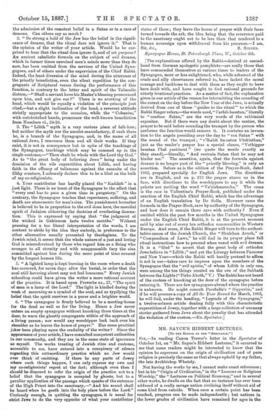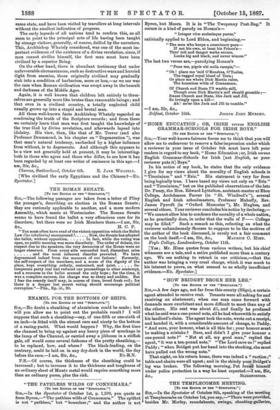MR. SAVOR'S HIBBERT LECTURES.
(To vas Berms or rat Betz...res."' Si,—In reading Canon Trevor's letter in the Spectator of October 1st, on "Mr. Sayer's Hibbert Lectures," it occurred to me that some readers might be interested to know that the opinion he expresses on the origin of civilisation and of pare religion is precisely the same as that always upheld by my father, the late Archbishop Whately.
Not baying the works by me, I cannot make exact references ; but in his "Origin of Civilisation," in the "Lessons on Religious Worship," the "Lectures on Political Economy," and in several other works, he dwells on the fact that no instance has ever been adduced of a really savage nation civilising itself without aid of some kind from outside. When once a certain point has been reached, progress can be made independently ; but nations in the lower grades of civilisation have remained for ages in the
same state, and have been visited by travellers at long intervals without the smallest indication of progress.
The early legends of all nations tend to confirm this, as all seem to point to the principal arts of life having been taught by strange visitors, generally, of course, deified by the narrators. This, Archbishop Whately considered, was one of the most im- portant evidences of the existence of a divine revelation, since, if man cannot civilise himself, the first man must have been civilised by a superior Being.
On the other hand, there is abundant testimony that under unfavourable circumstances, such as destructive wars and hurried flight from enemies, those originally civilised may gradually sink into a condition of barbarism, more or less,—as we see was the case when Roman civilisation was swept away in the tumult and darkness of-the Middle Ages.
Again, it is well known that children left entirely to them- selves are generally more like brutes than reasonable beings ; and that even in a civilised country, a totally neglected child usually grows up into a stupid and brutal man.
All these well-known facts Archbishop Whately regarded as confirming the truth of the Scripture records ; and from these we certainly learn that man was first taught the knowledge of the true God by divine revelation, and afterwards lapsed into idolatry. His view, then, like that of Mr. Trevor (and also Professor Drummond, in his chapter on " Degeneration "), was that man's natural tendency, unchecked by a higher influence from without, is to degenerate. And although this appears to be a view not generally held at present, it may be interesting, both to those who agree and those who differ, to see how it has been regarded by at least one writer of eminence in this age—I am, Sir, &a.,
Clarens, Switzerland, October 6th. E. JANE WHATELY. [Who civilised the early Egyptians and the Chinese P—En. Spectator.]



































 Previous page
Previous page